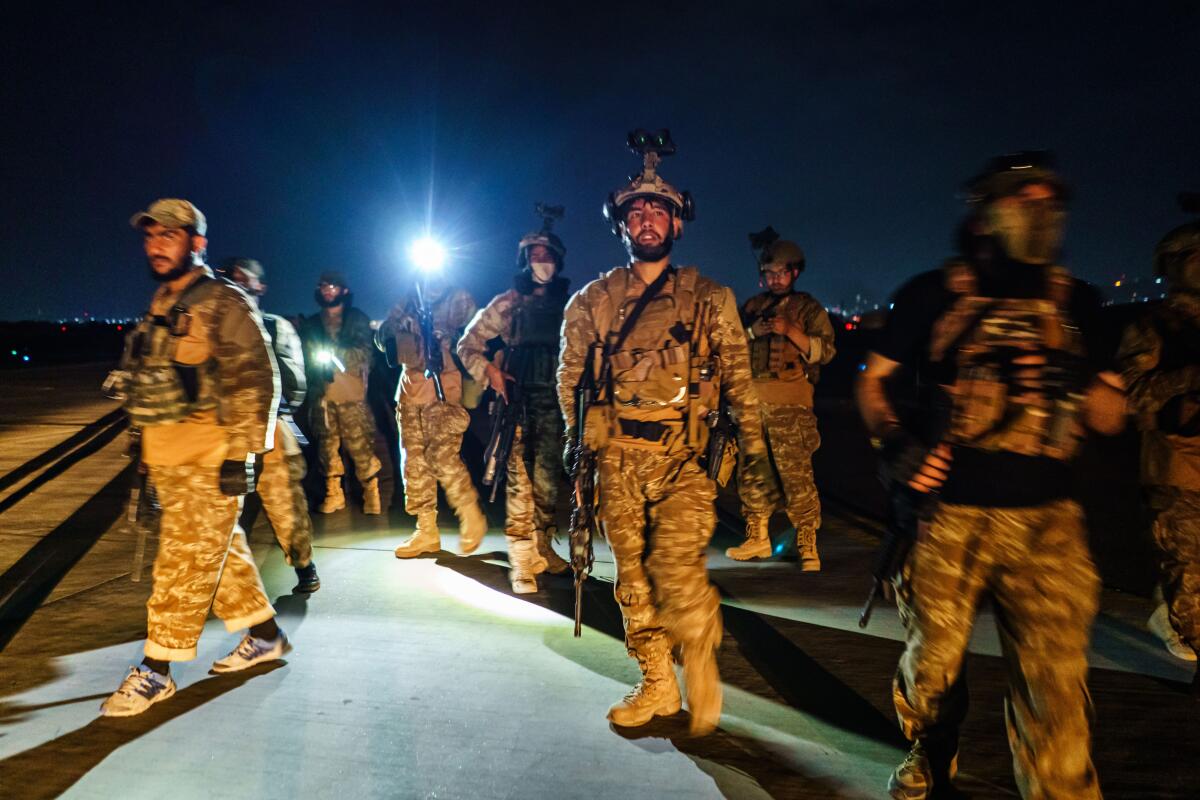Leaving Afghanistan: No right way to do the wrong thing

- Share via
The haunting image of a desperate Afghan man falling to his death from the fuselage of a departing U.S. C-17 military cargo plane will be forever burned in America’s collective consciousness and symbolic of our ignominious defeat after two decades in Afghanistan.
The U.S. has effectively been waging two wars concurrently in Afghanistan over the last two decades. One was by necessity: safeguarding America from transnational terrorist attacks. The other was a war of choice: bringing greater freedoms and opportunities to Afghanistan and her people.
When the commander of the 82d Airborne Division stepped on the ramp of the last military aircraft to fly out of Kabul on Monday, our war of choice officially ended in defeat while our war of necessity continues and must now be waged from a significantly less advantageous position.
There is no right way to do the wrong thing. The decision to withdraw all U.S. military forces by the arbitrarily chosen Aug. 31 deadline, given the conditions on the ground, significantly challenges our ability to protect our vital national interests in the continuing war of necessity.
Our war of choice involved expending American blood and treasure to bring democracy, greater freedoms, access to education and other improvements to the people of Afghanistan. That war, while well-intended, was eventually and accurately viewed as an overreach and not in our vital national interests to continue to pursue. But this effort to transform Afghanistan has been winding down steadily since President Obama declared the end of combat operations in 2014. U.S. troop presence scaled down from more than 100,000 troops in 2010 when the U.S. suffered nearly 500 combat deaths that year to approximately 2,500 troops over the last year, with no combat deaths suffered by U.S. forces until last Thursday’s tragic loss of 13 service members in the bombing at Kabul’s international airport.
Arguably, the last remaining objective in this greatly scaled back war of choice was to prevent a violent transition of government. A modest and sustainable presence of American troops, and the capabilities that came with it, could have provided the leverage needed to help compel the Taliban to uphold their end of the peace agreement — demonstrated progress on the political front and reaching some form of a negotiated political settlement with the elected government.
The war of necessity will continue. The 9/11 attacks made clear that Sunni extremist groups with global reach like Al Qaeda were at war not only with America but other societies as well. Subsequent attacks in that decade in London, Madrid and Mumbai underscored this reality. Interdicting terrorist groups that threaten the U.S. and her allies and partners and ensuring these groups are unable to reconstitute is necessary to safeguard our vital national security interests.
America cannot unilaterally decide this war is over. The enemy gets a vote and it remains to be seen if Afghanistan will once again become a safe haven for terrorist groups. We do know that our ability to interdict terrorist threats in this volatile region post-U.S. military withdrawal is now greatly diminished with the loss of intelligence, surveillance, reconnaissance and other capabilities. Counterterrorism operations based outside Afghanistan will require significant resources to support, be far less responsive and effective, and be conducted without support from our allies, given the limitations of their capabilities.
Pointing fingers and assigning blame for the missteps over the past 20 years and the especially damaging decisions made in the past several weeks make for raucous commentary but do not help us secure our enduring interests in Afghanistan and the region going forward.
For our important interest in preserving some semblance of freedoms and opportunities for the Afghan people, we are obliged to work with allies and partners in the region to create incentives and disincentives to encourage the Taliban to govern differently. In the run-up to last year’s peace deal, over 80% of respondents in The Asia Foundation’s “Survey of the Afghan People” expressed hope that the deal would preserve and protect the Afghan constitution, a strong central government, freedom of the press, freedom of speech and women’s rights.
Ideally, the generation of Afghans that now know what it is like to enjoy freedom and opportunity will be determined not to give it up and complicate the Taliban’s efforts to destroy those freedoms. Unfortunately, the historical record provides little reason for optimism on this count.
As for our enduring vital interest in protecting the U.S. homeland, it remains to be seen the degree to which terrorist organizations will reconstitute on Afghan territory. With groups like Al Qaeda and ISIS-K active in provinces across Afghanistan, the prospect of the country devolving into a failed state under Taliban rule, and a widely anticipated civil war, the prospects are grim indeed. Without the presence of our military in Afghanistan with intelligence capabilities, responsive air power and other resources, it is all the more critical that we work with allies and partners to identify and interdict terrorist threats.
One thing we do know: No president can simply declare this war is over. Our enemies will continue this fight and seek new ways to inflict harm.
Joseph Felter, former U.S. deputy assistant secretary of Defense /Army Special Forces Officer (ret), served in Afghanistan. He is a Hoover Institution Research Fellow at Stanford University.
More to Read
A cure for the common opinion
Get thought-provoking perspectives with our weekly newsletter.
You may occasionally receive promotional content from the Los Angeles Times.









